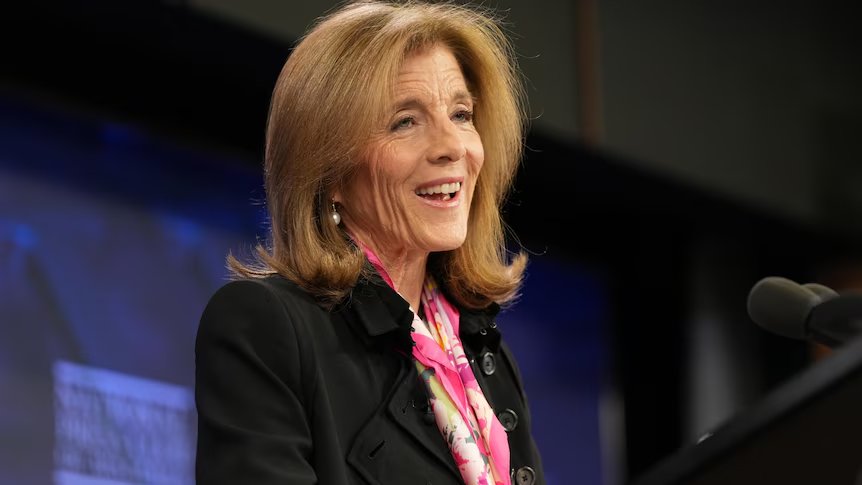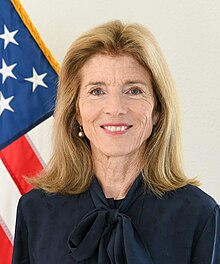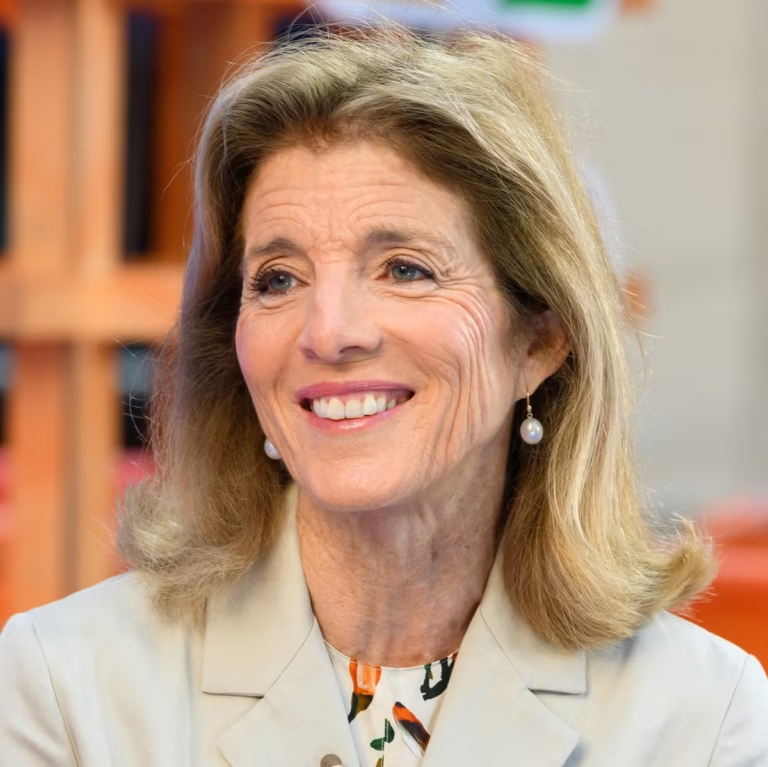
Caroline Kennedy: From First Daughter to Diplomatic Powerhouse
Caroline Kennedy, the daughter of President John F. Kennedy and Jacqueline Kennedy Onassis, has carved out a remarkable career that spans politics, law, and diplomacy. Born on November 27, 1957, in New York City, Kennedy’s life has been intertwined with American history from her earliest days.
Early Years in the White House
As the only surviving child of JFK, Caroline spent her formative years in the White House during her father’s presidency. This unique upbringing shaped her worldview and instilled a deep sense of public service.
A Private Life in the Public Eye
Despite her family’s fame, Caroline Kennedy has maintained a reputation as the most private member of the Kennedy clan. This discretion has allowed her to forge her own path while honoring her family’s legacy.
Legal Career and Literary Pursuits
Kennedy’s professional life showcases her diverse talents:
- Accomplished lawyer
- Prolific author and editor
- Co-writer of multiple books on constitutional law and civil liberties
From Obama to Trump: Navigating Political Waters
In 2013, President Barack Obama nominated Caroline Kennedy as U.S. Ambassador to Japan, a role she embraced with characteristic grace and diplomacy. Her tenure spanned both the Obama and Trump administrations, demonstrating her ability to work across party lines.
Kennedy and Trump: An Unexpected Alliance
While Caroline Kennedy’s political leanings have traditionally aligned with the Democratic Party, her diplomatic role required her to navigate the transition between the Obama and Trump administrations. This experience highlighted her adaptability and commitment to serving American interests abroad, regardless of the political climate at home.
Continuing the Kennedy Legacy
Caroline Kennedy’s ongoing work in public service and international relations continues to uphold her family’s tradition of dedication to the nation. As she moves forward in her career, many speculate about her potential future roles in American politics and diplomacy.
Conclusion
From her childhood in the White House to her diplomatic service under both Democratic and Republican administrations, Caroline Kennedy has proven herself a versatile and enduring figure in American public life. Her ability to bridge political divides and maintain her privacy while serving in high-profile roles makes her a unique and respected voice in contemporary politics.
Childhood of Caroline Kennedy
From Camelot’s Princess to Political Powerhouse
Caroline Kennedy: A Legacy of Hope and Resilience
Caroline Bouvier Kennedy, born on November 27, 1957, in New York City, emerged from the iconic Kennedy dynasty as a symbol of American grace and resilience. As the daughter of President John F. Kennedy and Jacqueline Kennedy Onassis, Caroline’s early years were steeped in the glow of her father’s transformative presidency.
The Camelot Era: A Childhood in the White House
During her father’s tenure, known as the “Camelot Presidency,” Caroline became America’s sweetheart. The nation watched in adoration as the young girl:
- Accompanied her father to the Oval Office
- Rode her pony on the White House lawn
- Captured hearts with her innocence and charm
Caroline’s presence in the White House embodied the hope and optimism that defined her father’s administration. The media couldn’t get enough of the little girl who represented the ideal American family.
From First Daughter to Political Force
As Caroline grew, she carried forward her family’s legacy of public service. Her journey from the White House to becoming a formidable political figure in her own right has been marked by:
• Dedication to education and literacy
• Advocacy for democratic values
• Diplomatic service as U.S. Ambassador to Japan
Caroline Kennedy and the Trump Era
In recent years, Caroline Kennedy has emerged as a vocal critic of former President Donald Trump. Her stance underscores the stark contrast between the Kennedy legacy and Trump’s approach to governance. Caroline’s criticism of Trump’s policies and rhetoric highlights her commitment to:
- Protecting democratic institutions
- Promoting civil discourse
- Upholding the values of her father’s administration
As America continues to navigate its political landscape, Caroline Kennedy remains a beacon of the ideals that once defined Camelot. Her ongoing involvement in public life serves as a reminder of a time when hope and optimism were the cornerstones of American politics.
Caroline Kennedy: From First Daughter to Political Figure in the Trump Era
The life of Caroline Kennedy, daughter of President John F. Kennedy, has been marked by both tragedy and resilience. From her early years in the White House to her recent political endeavors, Kennedy’s journey offers a fascinating glimpse into American history and politics.
Early Years and Family Tragedies
Following her father’s assassination in 1963, Caroline and her family moved from the White House to Georgetown, seeking privacy amidst intense public scrutiny. The relentless media attention eventually prompted a move to New York City in 1964, where Caroline began her education at the Sacred Heart School.
Tragedy struck again in 1968 with the assassination of her uncle, Robert F. Kennedy. This event led to her mother Jackie’s marriage to Greek shipping magnate Aristotle Onassis, bringing both security and complexities to Caroline’s life.
Education and Coming of Age
Caroline’s academic journey took her from the prestigious Brearley School in Manhattan to Concord Academy in Massachusetts. During this time, she developed a passion for photography and excelled in her studies, all while navigating the challenges of her high-profile family life.
Political Involvement and Public Service
As an adult, Caroline Kennedy has carried on her family’s legacy of public service. Her involvement in politics has included:
- Serving as U.S. Ambassador to Japan (2013-2017)
- Endorsing Barack Obama’s presidential campaign in 2008
- Briefly considering a run for Hillary Clinton’s Senate seat in 2008
Caroline Kennedy and the Trump Administration
During the Trump presidency, Kennedy maintained a relatively low profile in American politics. However, her family name and political legacy continued to carry weight in public discourse. Some key points of interest include:
- Kennedy’s stance on various Trump policies
- Comparisons between the Kennedy and Trump administrations
- Speculation about potential future political roles for Caroline Kennedy
Looking Ahead: Caroline Kennedy’s Future in Politics
As the political landscape continues to evolve, many wonder what role Caroline Kennedy might play in shaping America’s future. With her unique perspective as a member of one of America’s most prominent political dynasties, Kennedy remains a figure of interest in discussions about leadership and public service.
In conclusion, Caroline Kennedy’s life story intertwines personal struggles with a commitment to public service, offering insights into both American history and the ongoing evolution of U.S. politics. As the nation moves beyond the Trump era, Kennedy’s influence and potential future contributions to American political life remain subjects of keen interest and speculation.
Growing Up in the Spotlight
Title: Caroline Kennedy’s Journey: From Presidential Legacy to Political Powerhouse
Caroline Kennedy: A Legacy of Excellence and Public Service
In the shadow of one of America’s most influential political families, Caroline Kennedy emerged as a beacon of intellect and integrity. The daughter of President John F. Kennedy, Caroline’s upbringing was marked by her mother’s steadfast guidance, steering her and her brother away from the pitfalls of substance abuse and towards academic excellence.
Early Life and Education
Caroline’s formative years were spent navigating the prestigious private school system of New York City. Her academic prowess shone through, paving the way for her acceptance into the hallowed halls of Radcliffe College, now an integral part of Harvard University. During her undergraduate years, Caroline’s passion for journalism and politics began to blossom. She honed her skills through internships at the New York Daily News and under the tutelage of her uncle, Senator Ted Kennedy.
Professional Beginnings and Personal Milestones
Upon graduating in 1980 with a bachelor’s degree, Caroline embarked on a diverse career path. Her first professional role at the Metropolitan Museum of Art not only expanded her cultural horizons but also led to a serendipitous encounter with Edwin Schlossberg, an interactive-media designer who would later become her husband.
Parallel to her professional pursuits, Caroline assumed the role of president at the John F. Kennedy Library Foundation. This nonprofit organization plays a crucial role in supporting the John F. Kennedy Presidential Library and Museum, ensuring the preservation of her father’s legacy.
A Fairytale Wedding
On July 19, 1986, Caroline Kennedy and Edwin Schlossberg exchanged vows in a picturesque Cape Cod ceremony. Despite the family’s efforts to maintain privacy, the event captured nationwide attention, drawing a crowd of over 2,000 spectators to the church and surrounding areas.
Caroline Kennedy in the Trump Era
While Caroline Kennedy has largely steered clear of partisan politics, her family’s Democratic legacy has occasionally intersected with the tumultuous Trump administration. As a respected public figure, Caroline’s measured responses to political developments have been closely watched, offering a stark contrast to the often divisive rhetoric of the Trump years.
Conclusion
From her early days as a studious young woman to her current status as a public figure, Caroline Kennedy has carried the weight of her family’s legacy with grace and determination. Her journey serves as a testament to the enduring impact of the Kennedy name in American politics and culture, even in the face of changing political landscapes.
Advanced Education
Caroline Kennedy’s Political Journey: From Law School to Quiet Influence
Caroline Kennedy, daughter of President John F. Kennedy, has always been a figure of intrigue in American politics. While her family name carries significant weight, Caroline has forged her own path, often preferring to work behind the scenes rather than in the spotlight.
Early Career and Education
After completing her undergraduate studies, Caroline made the decision to pursue a legal career. She enrolled at Columbia Law School, demonstrating her commitment to understanding the intricacies of the American legal system. In 1988, Caroline graduated alongside 380 fellow students in a private pre-commencement ceremony, keeping true to her desire for privacy.
Family and Personal Life
The same year as her law school graduation, Caroline welcomed her first child, Rose, into the world. This marked the beginning of her journey as a mother, a role she has always prioritized alongside her professional endeavors.
Establishing the Profile in Courage Awards
In 1989, Caroline Kennedy made a significant contribution to the political landscape by establishing the Profile in Courage Awards. This prestigious honor recognizes elected officials who have demonstrated exceptional political courage, reinforcing the values of integrity and bravery in public service.
Literary Pursuits
Caroline’s passion for constitutional law led her to co-author “In Our Defense: The Bill of Rights in Action” with fellow law graduate Ellen Alderman. Showcasing her independence, she chose to publish the book through William Morrow & Co. in February 1991, deliberately avoiding her mother’s publishing industry connections.
Unexpected Career Moves
In a move that surprised many, Caroline declined an offer to chair the 1992 Democratic National Convention. This decision highlighted her preference for working on personal projects and focusing on her family, rather than stepping into high-profile political roles.
Caroline Kennedy and the Trump Era
While Caroline Kennedy has maintained a relatively low profile in recent years, her family’s legacy and her own political acumen have kept her relevant in discussions about American politics. During the Trump administration, Kennedy’s commitment to democratic values and civil rights stood in stark contrast to many of the policies and rhetoric associated with President Trump’s tenure.
Conclusion
Caroline Kennedy’s journey from law school graduate to influential behind-the-scenes figure in American politics demonstrates the power of quiet dedication and principled action. Her work in constitutional law, establishment of the Profile in Courage Awards, and focus on family and personal projects have all contributed to her unique place in the political landscape, distinct from both her famous family name and the more recent Trump-era politics.
Work and Politics
Caroline Kennedy: A Legacy of Public Service and Literary Pursuits
In the ever-evolving landscape of American politics, Caroline Kennedy stands out as a beacon of dedication to public service and literary excellence. While her family name carries significant weight, Kennedy has forged her own path, leaving an indelible mark on both the literary world and public affairs.
Literary Contributions: Honoring a Mother’s Legacy
Following in her mother’s footsteps, Caroline Kennedy has made significant contributions to literature. In 2001, she paid tribute to Jacqueline Kennedy Onassis by compiling “The Best-Loved Poems of Jacqueline Kennedy Onassis.” This heartfelt anthology showcased her mother’s passion for poetry and offered readers a glimpse into the former First Lady’s literary tastes.
Kennedy’s editorial prowess continued to shine as she curated two more notable collections:
- “Profiles in Courage for Our Time” (2002)
- “A Patriot’s Handbook: Songs, Poems and Speeches Every American Should Know” (2003)
These works not only highlighted Kennedy’s literary acumen but also reflected her deep appreciation for American history and culture.
Championing Children’s Literature
In 2005, Caroline Kennedy released “A Family of Poems: My Favorite Poetry for Children,” demonstrating her commitment to fostering a love of literature in younger generations. This collection was followed by “A Family Christmas” in 2007, further cementing her status as a respected figure in the literary world.
Public Service: A Kennedy Tradition
While Caroline Kennedy’s literary endeavors have garnered significant attention, her dedication to public service remains equally noteworthy. She has taken on several crucial roles, including:
• Member of the national board of directors for the NAACP Legal Defense and Educational Fund
• Vice chair for the Fund for Public Schools in New York City
• Chief executive for the New York City Department of Education Office of Strategic Partnerships
These positions underscore Kennedy’s commitment to education, civil rights, and community development.
A Brief Foray into Politics
In 2008, the typically private Caroline Kennedy made headlines when rumors circulated about her potential candidacy for Hillary Clinton’s vacant Senate seat. This unexpected move sparked intense media speculation and public interest. However, Kennedy ultimately withdrew her bid, citing personal reasons.
Caroline Kennedy vs. Trump: Contrasting Approaches to Public Service
While Caroline Kennedy has maintained a relatively low profile in recent years, her approach to public service stands in stark contrast to that of former President Donald Trump. Kennedy’s focus on education, literature, and civil rights reflects a more traditional approach to public service, rooted in her family’s legacy of political engagement and philanthropy.
In contrast, Trump’s unconventional presidency and confrontational style represented a significant departure from the Kennedy family’s approach to politics and public service. This difference in style and substance highlights the diverse paths individuals can take in serving their country and shaping public discourse.
As America continues to navigate complex political and social challenges, figures like Caroline Kennedy remind us of the enduring impact of public service, literary engagement, and a commitment to education and civil rights.
Japan’s U.S. Ambassador
Caroline Kennedy, daughter of former President John F. Kennedy, has carved out a notable career in diplomacy and public service. Her appointment as the U.S. Ambassador to Japan in 2013 marked a significant milestone in her professional life.
Caroline Kennedy’s Nomination as U.S. Ambassador to Japan
On July 24, 2013, President Barack Obama nominated Caroline Kennedy as the U.S. Ambassador to Japan. This announcement put an end to widespread speculation in the media about her potential diplomatic role. The nomination process culminated in October of the same year when the U.S. Senate officially approved her appointment.
A Distinguished Lineage of Ambassadors
Kennedy’s appointment placed her in a prestigious line of former U.S. Ambassadors to Japan. She succeeded John Roos, who had held the position since August 2009. Other notable figures who previously served in this crucial diplomatic role include:
- Walter Mondale
- Howard Baker
- Tom Foley
Personal Life
From Political Royalty to Trump-Era Ambassador
In the ever-evolving landscape of American politics, few names carry as much weight as Caroline Kennedy. As the daughter of President John F. Kennedy and Jacqueline Kennedy Onassis, Caroline has long been a figure of public interest. However, her role in recent years, particularly during the Trump administration, has shed new light on her political acumen and diplomatic skills.
A Family Legacy Continued
Caroline Kennedy’s personal life has been a subject of fascination for many. Her marriage to Edwin Schlossberg in 1986 marked a new chapter in her life, one that would soon include parenthood. The couple has three children:
- Rose Kennedy Schlossberg
- Tatiana Celia Kennedy Schlossberg
- John “Jack” Kennedy Schlossberg
Each of these children has grown to embody the Kennedy family’s commitment to public service and civic engagement, carrying forward their mother’s legacy.
From Author to Ambassador
While Caroline Kennedy’s early career focused on law and writing, her political involvement grew over time. Her endorsement of Barack Obama in 2008 signaled a more active role in national politics. However, it was her appointment as the U.S. Ambassador to Japan in 2013 that truly thrust her into the international spotlight.
Navigating the Trump Era
When Donald Trump took office in 2017, many wondered how the changing political landscape would affect Caroline Kennedy’s role. Despite the stark differences between the Trump administration and her family’s Democratic roots, Kennedy maintained her diplomatic position until shortly before Trump’s inauguration.
The transition period highlighted Kennedy’s ability to navigate complex political situations. Her graceful exit from her ambassadorial role and subsequent public statements demonstrated her commitment to American diplomacy, regardless of partisan divides.
Looking Ahead
As the political landscape continues to shift, Caroline Kennedy remains a influential figure in American public life. Her experiences during the Trump era have only added to her political résumé, positioning her as a potential player in future administrations.
Whether as a diplomat, author, or public figure, Caroline Kennedy continues to uphold her family’s legacy while forging her own path in the ever-changing world of American politics.



Для получения квалифицированной помощи в вопросах раздела имущества, обратитесь к специалистам на мировое соглашение раздел имущества.
Раздел 2.1.2
Innovations such as the wheel and the internet have profoundly influenced our society.
design ideas that changed life https://washingtondchotelsonline.com/index.php/2025/06/10/brilliant-by-design-the-stories-behind-everyday-innovations/